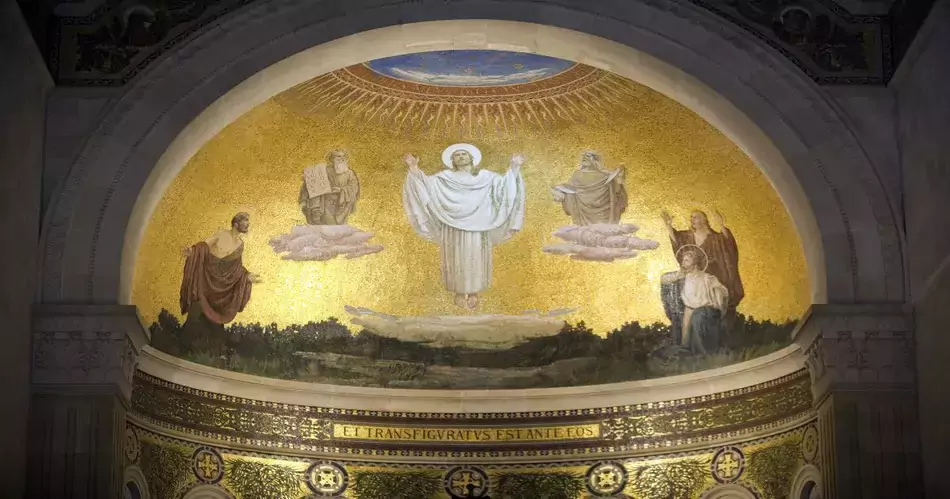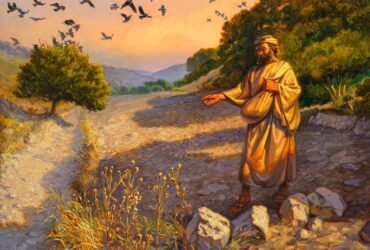Second Sunday in Lent – Year B – Mk 9: 2-10
Richard Rohr, a Franciscan priest and widely acclaimed spiritual writer, brought out a book a few years ago, entitled “Falling Upwards.” His main thesis in this book is that life is divided into two halves. The first half of life is all about building one’s tower. As you might imagine, building your tower is all about piling up achievements, establishing a name for yourself, making a success of your life and acquiring all the attendant status symbols that this entails. But then once you have built your tower, the second part of life curiously requires that a person learn how to jump off their tower – this is the path of descent, the path of unknowing, the path of quiet surrender. In the second half of life, we need to learn to let go, let go of being able to control our children, and let them live their own lives and make their own mistakes. Whether we like it or not, we must let go of our good health, our memory and the control of our faculties. Growing old is a preparation for the final letting go, death, when we will be invited to surrender our spirits into the hands of God our Creator, just like Jesus did from the cross. Paradoxically, Richard Rohr claims that this process of jumping off one’s tower can actually be more fulfilling and joyful than the first half of life that we spend building our towers. Sadly, Rohr observes that while society is very good at teaching us how to build our towers in the first part of life, it is clueless about how to help someone jump off their tower in the second half of life.
In today’s gospel we hear the story of the transfiguration which comes at a critical point in Mark’s gospel – at roughly the half-way point. Up until this point Jesus has been wildly successful in his mission. He is followed by throngs of adoring crowds who hand on his every word and who have been amazed by his miracles and captivated by his authoritative teaching. The transfiguration represents the pinnacle of the revelation of Jesus as well and truly the Son of God. What Jesus is effectively doing in the transfiguration is that he is climbing up to the very top of the tower with his disciples in order that there might be no doubt in their mind at all that he is who they suspect he is: the Messiah, the Son of God. For the rest of the next half of the gospel of Mark, we are going to see Jesus jumping off his tower. The first prophecy of the passion comes just before the Transfiguration. After the transfiguration, Jesus goes on to impress upon his disciples the necessity of his suffering two more times. While Jesus still preaches to the crowds, we see him far more intent upon teaching his disciples the importance of self-renunciation. He desperately wants them to understand the downward path that he is about to take that is ultimately going to lead to his death on the cross. Coming down the mountain is both literal and figurative – Jesus is descending from his tower, and teaching his disciples that one can only save one’s life if one is prepared to lose it.
But before you can lose your life, you need to have proved to yourself and to the world that you had something to lose. There needs to be a false self to abandon. Our success helps us to build a healthy sense of self. We need the affirmation that comes with success in order to quieten the voices of self-doubt and unworthiness that hide deep within us. But once we have that self-confidence that initially comes from our own achievements, we need to wean ourselves off this powerful drug that can become so addictive and transition to living from the only drug that will not harm us: God’s love. I think that Jesus’ transfiguration teaches us a valuable lesson – that the only thing that can give us the confidence to descend from our towers is having a deep experience of the unconditional love of God. Have you ever been in a situation where you have felt so completely fulfilled, so completely filled with an unadulterated joy that you have said to yourself, if I die today – I don’t mind – I have truly lived life? This was the experience of Jesus on Mt. Tabor – “this is my Son the beloved – with whom I am well-pleased.”
Our greatest accomplishment in life is letting ourselves be loved by God. When we are ready to admit to ourselves that there is nothing that we need to do to earn God’s love that we are then ready to jump off our towers. This is because we now finally realize that all that we have achieved is not really necessary for our self-worth. We gain the freedom to jump of our towers because we realize that doing so will not in any way change our inherent worth. If anything, it will increase our inherent worth, because we enter what I call the seed-multiplier effect. At a certain stage in our lives our towers start preventing us from bearing the fruit that God wishes us to bear. “Unless a grain of wheat should fall upon the ground and die, it remains but a single grain with no life, but if it dies, it bears fruit in plenty.”
This is exactly the lesson that the first reading wants to teach us as well. Abraham was finally beginning to make it in life. He had become a very wealthy man in his old age, and now with his son Isaac, he seemed to think that he was finally on his way to establishing a dynasty. But then he reached a cross-roads, where it seemed for him that faithfulness to God demanded that he sacrifice Isaac, that which was most dear to him. He was prepared to do this, he did not balk at the prospect of demolishing the very corner stone of his tower that would lead to the crumbling of his whole tower. Instead his willingness to sacrifice everything becomes the testament of his faithfulness that establishes him as our father in faith. He also realizes a valuable lesson, namely that God’s invitation to us to “jump off our tower” doesn’t always mean giving up everything that is important to us. What is important to God is that we are at least willing to put God first in our lives. This is what Lent is all about – having the fundamental experience of God’s love as Jesus did on Mt. Tabor that enables us to begin our paths of descent and of self-emptying in order that we might be truly fruitful.
Questions for reflection:
1. How reliant are you on your personal achievements for your own sense of self-worth?
2. Have you ever felt/heard God say to you: “You are my beloved child in whom I am well pleased?”
3. Have you ever had a moment when you felt completely happy, at one and at peace with the world? What were you doing and where were you?
By Fr Isaac Fernandez SJ










Leave a Reply